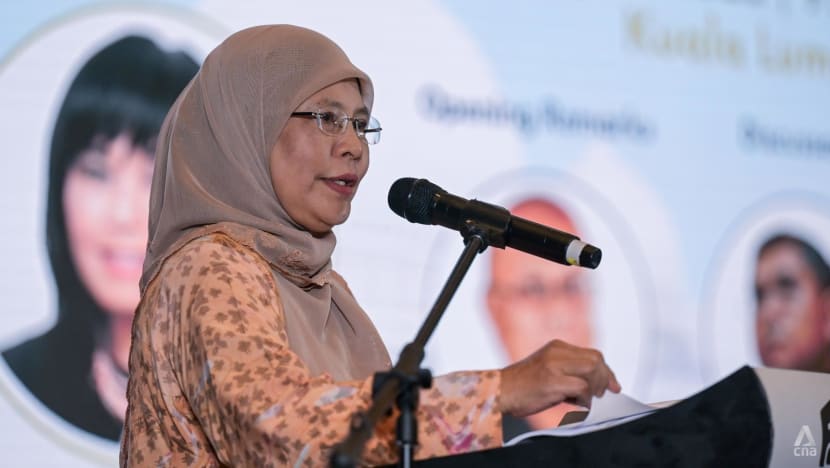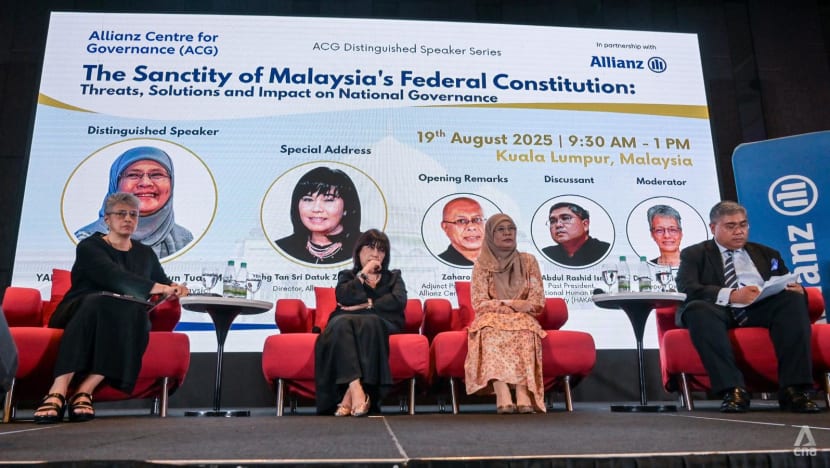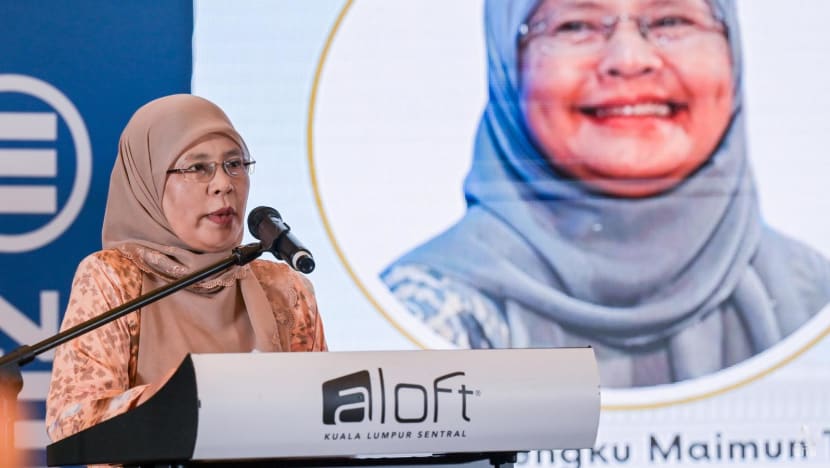Malaysia’s ex-chief justice opens up on recent delay in appointing top judges, ‘transparency problem’
Tengku Maimun Tuan Mat agreed the constitution should be amended to remove the prime minister’s role in judicial appointments.

Former Chief Justice of Malaysia Tengku Maimun Tuan Mat speaking at a forum on the country's Federal Constitution in Kuala Lumpur on Aug 19, 2025. (Photo: CNA/Fadza Ishak)

This audio is generated by an AI tool.
KUALA LUMPUR: Nobody was to blame for the recent delay in appointing Malaysia’s top judges as the process played out on a set schedule involving the country’s Malay rulers, retired Chief Justice Tengku Maimun Tuan Mat said on Tuesday (Aug 19).
Even so, the process of appointing these top judges should be more transparent, she said, acknowledging that the prime minister’s involvement created a “perception” of potential interference.
Tengku Maimun, 66, was making her first direct remarks on the recent controversy in the judiciary since retiring as the nation’s top judge on Jul 2, after which her position and another top post remained vacant for more than two weeks.
The leadership vacuum in the judiciary had triggered widespread speculation of differences between Prime Minister Anwar Ibrahim’s government and the Judicial Appointments Commission (JAC), amid allegations of judicial interference.
The JAC is an exclusive panel of nine made up of judges as well as current and former members of the legal fraternity. It proposes qualified candidates for the country’s top positions in the judiciary.
The prime minister makes a final decision based on the recommendations. This decision is then put up for endorsement by heads of the country’s royal households who make up the Conference of Rulers.
“Honestly, I don't really see the huge delay (in appointing the top judges) because the appointments would have to be done through the Conference of Rulers,” Tengku Maimun said at a dialogue session on safeguarding Malaysia’s constitution, organised by the Allianz Centre for Governance.
“And as we all understand, the Conference of Rulers will sit on dates that are scheduled way ahead – I think they would be meeting about four or five times a year, about there.”
While the JAC would submit its recommendations to relevant authorities “way in advance”, the process would still need to involve the Malay rulers, Tengku Maimun said.
“Because of the process of the consultation between the Yang di-Pertuan Agong and the rulers’ conference that needs to take place, there is a delay there … I mean, the fault is nobody's fault,” she added, using the official term for the king.
JUDICIAL INTERFERENCE?
Malaysia’s top two judiciary posts were vacant after the back-to-back retirements in early July of Tengku Maimun and Abang Iskandar Abang Hashim as the President of the Court of Appeal.
Their replacements were announced only 15 days later in the early hours of Jul 18.
Justice Wan Farid Wan Salleh and Justice Abu Bakar Jais are now the Chief Justice and President of the Court of Appeal, respectively, while Justice Azizah Nawawi took over as Chief Judge of Sabah and Sarawak from Justice Abdul Rahman Selbi after he retired.
Anwar said the next day that the appointment of a new chief justice cleared him of any interference claims, including speculation that former Attorney General Ahmad Terrirudin Salleh was eyed for the role.
The judicial controversy had deepened on Jul 12 when the purported minutes of a JAC meeting in May were uploaded on social media, alluding to earlier claims of misconduct against Terrirudin.
The leaked memo also referred to previously reported allegations that Terrirudin pressured then-Chief Justice Tengku Maimun to rule in favour of certain parties in an unspecified case and pushed for the reappointment of judges linked to ongoing trials.
The Attorney General’s Chambers dismissed the claims as “speculation”.
Asked on Tuesday if she had ever experienced judicial interference, Tengku Maimun said “never” during her tenure at the High Court and the Court of Appeal.
“Unfortunately, towards the end of my tenure as a chief justice, there was a bit of semblance of attempted interference,” she said.
“But then again, it all depends on the judges. There may be interference, left, right, centre, but if you ignore them, nothing will happen, and the judiciary will remain intact and judicial independence will be upheld,” said Malaysia’s first female chief justice, who was appointed in May 2019.
Addressing the broader issue of transparency in the appointment of top judges, Tengku Maimun said it was “unfortunate” that the JAC meeting minutes were leaked.
“We have a ‘transparency problem’ because there is a specific provision in the JAC Act that prohibits communication of whatever matters that were discussed in the JAC to anybody outside,” she said.
“So in that sense, due to the existence of that secrecy provision, which some argue is harsher or stronger than the Official Secrets Act, therefore there is no transparency there.”
On Jul 15, Law Minister Azalina Othman Said said the government will look into amending the JAC Act 2009 to prevent confusion in the process of appointing judges in the country.
"There will be a comprehensive discussion. I have also invited the Bar Council to be involved from the early stages, to provide balanced perspectives and views,” she reportedly said.
PM’S INVOLVEMENT IN JUDICIAL APPOINTMENTS
For years, the Malaysian Bar Council - the body that represents the country's advocates and solicitors - has advocated for reforms to the JAC Act.
These include amendments to reduce the judge-centric composition of the JAC for greater diversity, as well as to review the role of the executive in the judicial appointments process.

Tengku Maimun stressed on Tuesday that the JAC Act sets out requirements for the promotion of judges to a higher court, and that the JAC has “religiously” adhered to this criteria.
“The problem, if any”, would be after the processes that have been undertaken by the JAC, she said.
Whether the names selected by the JAC are accepted by the prime minister under the Federal Constitution is a “separate issue”, she said.
Tengku Maimun noted that the Bar Council is looking into this issue, including proposals to incorporate the JAC Act in the constitution, and possibly remove the prime minister’s involvement in appointing top judges.
She had previously made such a suggestion on the PM’s role too.
On Tuesday, the former chief justice reiterated that the “best solution” is to amend the Federal Constitution and incorporate existing provisions from the JAC Act on the procedures and processes of appointing judges.
She noted that some have argued that because the JAC procedures are not enshrined in the constitution, its recommendations are not binding for the prime minister, who still has the "prerogative" to select candidates and discuss his picks with the rulers.
“We will have to wait and see whether the Bar Council is going to take this further,” she added.
Tengku Maimun also acknowledged the prime minister appoints four of the JAC’s nine members, noting a perception that “there seems to be a bit of a problem there”.
“Because the perception would be … whatever wishes that the prime minister would wish to carry through, then perhaps these eminent members of the commission would be perhaps bound, or rather they would be obliged to act on the request of the prime minister,” she said.
“But then again, I think in the judiciary, perception matters. So again, I suspect that this would be one of the areas where the Bar Council is also looking into when they propose to amend the JAC Act.”
At the 24th Commonwealth Law Conference in Malta in April, Tengku Maimun had said that removing the prime minister’s role in judicial appointments could help address perceptions of political influence in the judiciary.
A former Malaysian law minister was quoted as saying on Jul 10 that Tengku Maimun did not receive an extension of service because she publicly implied the prime minister had interfered in judicial appointments.
Senior judges are typically granted a six-month extension when they reach retirement age.

However, close associates of Tengku Maimun and people in Anwar’s inner circle noted that the jurist had made clear to the premier that she was not keen on an extension, CNA reported in February.
On Tuesday, Tengku Maimun said her speech in Malta had created a “big hoo-ha for no reason”.
She noted that the Negeri Sembilan ruler Tuanku Muhriz Tuanku Munawir, while chairing the JAC in 2022, had said that the prime minister’s appointment of eminent persons in the JAC should be revised.
Asked by a member of the audience for her take on the single biggest threat to judicial independence at the moment, Tengku Maimun had a simple answer.
“Personally, I would think that the biggest threat would be the politicians,” she said to laughter and applause.




















